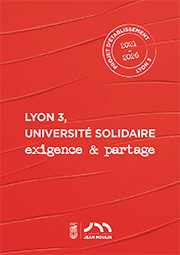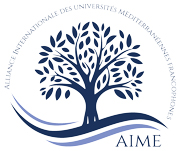AccueilRechercheProgrammes et productions scientifiquesThèsesThèses soutenuesThèses soutenues - 2006-2021Thèses soutenues - 2015
-
Partager cette page
- Recherche,
BARBARO Vanessa
Les nouveaux risques : aspects de responsabilité civile et d’assurance. Etude de droit fran?ais à la lumière des droits américain et chinois.
Publié le 7 septembre 2015 – Mis à jour le 7 octobre 2015
Thèse en Droit mention Droit public soutenue le 21 juillet 2015.
L’expression ? nouveaux risques ? est de plus en plus employée pour désigner les risques sanitaires et environnementaux liés au progrès scientifique et technique lorsque leurs conséquences dommageables bien qu’anticipées sont entourées d’un fort contexte d’incertitude scientifique. Cette incertitude est souvent invoquée par les professionnels créateurs de ces risques pour tenter d’échapper à leur responsabilité et, quand ils n’y parviennent pas, pour en faire supporter la charge par leur assureur de responsabilité, au risque d’accréditer l’idée que l’assurance déresponsabilise. C’est autour de la question de l’assurabilité des nouveaux risques, ou plut?t de leur inassurabilité, que cette thèse est construite. Il s’est agi d’étudier l’aptitude du système actuel de responsabilité du fait des produits, aidé par l’assurance de cette responsabilité, à satisfaire l’objectif social de prise en charge des victimes de nouveaux risques. Les solutions du droit fran?ais ont été éprouvées à la lumière de celles retenues par les droits américain et chinois qui sont confrontés aux mêmes problèmes. A cet égard, l’étude des nouveaux risques, en conduisant à revisiter la notion de risque assurable, fait prendre conscience des limites des systèmes actuels de prise en charge. Il appara?t opportun de revenir aux fondamentaux du droit de la responsabilité et du droit des assurances tout en recherchant des techniques complémentaires. Ce pourrait être le recours à la solidarité nationale (par la création d’un fonds d’indemnisation) ou aux marchés financiers.
The expression ? emerging risks ? is increasingly used to describe the health and environmental risks related to scientific and technical progress whenever their damaging consequences, although anticipated, are shrouded in an opaque veil of scientific uncertainty. The professionals, who created these risks, often use this uncertainty in an attempt to avoid any liability. When unable to do so, they try to have them covered by their liability insurance, even though such behavior fuels the idea that insurance promotes irresponsible behavior. This thesis is built around the question of the insurability, or to be more precise, the non-insurability of emerging risks. The aim was to study the capacity of the current products liability system, complemented by the relevant liability insurance, to meet the social goal of taking care of the victims of those ? emerging risks ?. The solutions provided by the French law system have been put up for a test by comparing them with those of the American and Chinese ones, while taking into account the contextual problems met by the latter. In this regard, the study of emerging risks leads us to review the concept of insurable risk, and to admit there are limits to the current system dealing with the victims’ compensation. It seems appropriate to refer back to the fundamentals of liability law and insurance law while seeking additional solutions. Appealing to national solidarity (through the setting up of a compensation fund) or to financial markets could be the solution.
Mots-clés : nouveaux risques - responsabilité civile - produits défectueux - assurance - aléa - faute intentionnelle - indemnisation - dommage corporel - solidarité nationale - financiarisation.The expression ? emerging risks ? is increasingly used to describe the health and environmental risks related to scientific and technical progress whenever their damaging consequences, although anticipated, are shrouded in an opaque veil of scientific uncertainty. The professionals, who created these risks, often use this uncertainty in an attempt to avoid any liability. When unable to do so, they try to have them covered by their liability insurance, even though such behavior fuels the idea that insurance promotes irresponsible behavior. This thesis is built around the question of the insurability, or to be more precise, the non-insurability of emerging risks. The aim was to study the capacity of the current products liability system, complemented by the relevant liability insurance, to meet the social goal of taking care of the victims of those ? emerging risks ?. The solutions provided by the French law system have been put up for a test by comparing them with those of the American and Chinese ones, while taking into account the contextual problems met by the latter. In this regard, the study of emerging risks leads us to review the concept of insurable risk, and to admit there are limits to the current system dealing with the victims’ compensation. It seems appropriate to refer back to the fundamentals of liability law and insurance law while seeking additional solutions. Appealing to national solidarity (through the setting up of a compensation fund) or to financial markets could be the solution.
Keywords : emerging risks - liability - defective products - insurance - hazard - willful misconduct - compensation - physical injury - national solidarity - financialization.
Directeur de thèse : Luc MAYAUD
Membres du jury :
Anne PELISSIER, Professeur des universités, Université de Montpellier I
Olivier MORETEAU, Professeur des universités, Université d’Etat de Louisiane
Jér?me KULLMANN, Professeur des universités, Université Paris- Dauphine
Jiayou SHI, Professeur des universités, Université du Peuple de Chine
Luc MAYAUX, Professeur des universités, Université Jean Moulin Lyon 3
Président du jury : Jér?me KULLMANN
Mention : Très honorable avec les félicitations
Equipe d'accueil : Equipe de droit privé
Documentation
Mise à jour : 7 octobre 2015







